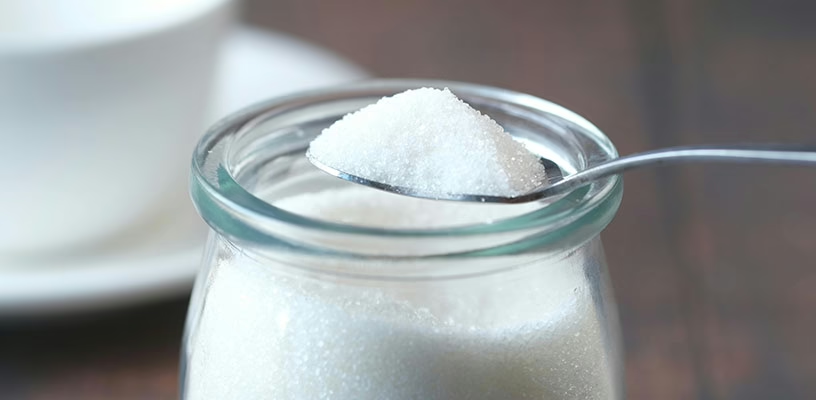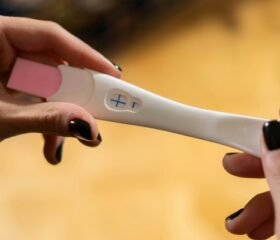Does the DIY Sugar Pregnancy Test Really Work?
There’s no shortage of questionable pregnancy tips online. One that’s been making the rounds recently is the idea that you can test whether you’re pregnant by using a few spoonfuls of sugar.

Before you raid your pantry, let’s look at the science behind the sugar test and see whether it’s a legitimate way to check for pregnancy or just another of the many health-related myths on the web.
What is a sugar pregnancy test, and how does it work?
In a nutshell, the sugar pregnancy test involves mixing your pee with sugar in a bowl. Here’s how to do it:
- Place a few spoonfuls of white sugar into a clean bowl.
- Collect your first-morning pee in a clean cup.
- Pour your pee over the sugar.
- Wait a few minutes without stirring or mixing.
Proponents of the method say that if the sugar clumps up, the test is positive and confirms that you’re pregnant. If the sugar dissolves easily, there’s no baby on the way.
What is the supposed science behind the sugar test?
According to the test’s advocates, sugar reacts with human chorionic gonadotropin (hCG), the hormone your body produces when you’re pregnant. Supposedly, this reaction causes the sugar to stick together.
Your hCG concentration is highest in your first-morning pee, so the sugar pregnancy test’s advocates recommend trying this in the morning. 1
Is there any evidence that the sugar test really works?
Unfortunately, there’s no scientific basis for the sugar pregnancy test. No studies exist that support the assertion that hCG reacts with sugar in the way that proponents of the sugar pregnancy test claim.
This is just one of many fake testing methods that use household items. You may have also read that you can test for pregnancy with: 2
- Baking soda
- Bleach
- Salt
- Shampoo or soap
- Toothpaste
None of these actually work. You shouldn’t read anything into how substances like this react with your pee (which may be affected by your diet and hydration level, but not by whether or not you’re pregnant).
Doctors can perform a legitimate “sugar test” for diabetes
It’s worth noting that there is one pregnancy-related “sugar test” that is legit—the glucose test, which helps detect gestational diabetes. Research shows that around 7% of moms-to-be in North America develop this condition. Since many moms don’t experience clear gestational diabetes symptoms, your doctor will probably proactively test for it when you’re between 24 and 28 weeks pregnant. This test has nothing to do with the DIY sugar pregnancy test, and you can’t take it at home.
What pregnancy tests actually work?
Fortunately, you don’t have to rely on questionable homemade methods to figure out whether you’re pregnant. Try one of these instead:
Home pregnancy tests
Traditional home pregnancy tests work by detecting hCG in your urine. Once you’re pregnant, your body starts producing hCG, with levels rising rapidly in the early weeks. 3
Standard pregnancy test strips contain antibodies that react to hCG, creating a visible line or symbol that indicates a positive result.
How to use a self-testing pregnancy kit
You can test if you’re pregnant as soon as you miss your period. Each home pregnancy test has its own instructions, so be sure to carefully read them before taking the test. Most of the time, you’ll need to
- Hold the test stick or strip in your pee stream (you can also dip the test stick or strip in a clean cup filled with your urine).
- Follow the directions in the testing packet, noting the time needed to wait for accurate results.
How the test indicates a positive or negative result depends on the brand of testing kit you use. Some tests display a line or plus symbol, while others show “pregnant” or “not pregnant” on the strip or stick.
Can home pregnancy tests be inaccurate?
When you use them correctly, pregnancy tests are 99% accurate. 4 While faulty tests aren’t unheard of, when a test’s results are questionable, it’s more likely that:
- You misinterpreted the results: It’s possible to misread the results if you don’t follow the instructions correctly, pee on the wrong part of the test, or read the wrong line.
- Your hCG levels are too low: During the very early days of pregnancy, your hCG levels may be too low to detect on a home pregnancy test. 3
- Your urine is too diluted: If you drank too much water, your urine may be too diluted for the test to work accurately.
Note that if you see a faint line on your pregnancy test (that isn’t the “control” line, which should alway shows up), that’s probably a positive result. However, again, if you’re unsure, the right move is just to wait a couple of days for your hCG levels to rise higher and test again.
Similarly, if you get what you suspect might be a false positive or false negative on your pregnancy test, your best move is to wait a few days and try again. Remember to take the test first thing in the morning and to follow the instructions exactly.
Professional testing
Another surefire way to know if you’re pregnant is to visit your OB and get a blood pregnancy test. These tests are much more sensitive than home pregnancy tests and can spot pregnancy much earlier, often as early as 6–8 days after conception, before you even miss your period. 5
Final thoughts
Taking an accurate and legitimate pregnancy test is very important. Confirming your pregnancy will allow you to make informed healthcare decisions for yourself and your little one and potentially get a head start on your prenatal care.
While the sugar pregnancy test might seem like a fun and inexpensive alternative to a traditional test kit, it’s a bad way to determine if you are expecting or not.
Stick to using pregnancy testing methods that are backed up by years of research. Self-testing pregnancy kits are inexpensive and easy to purchase. Just follow the instructions to get accurate results and determine what you should do next.
Article Sources
- University of Florida Health. "Pregnancy Test" Retrieved May 8, 2025.
- Clearblue. "Debunking homemade “pregnancy tests”: What you need to know" Retrieved May 8, 2025.
- MedlinePlus. "Pregnancy Test" Retrieved May 8, 2025.
- Planned Parenthood Federation of America, Inc.. "Pregnancy Tests" Retrieved May 8, 2025.
- Lifeline Urgent Care. "How Soon Can a Blood Test Detect Pregnancy?" Retrieved May 8, 2025.







